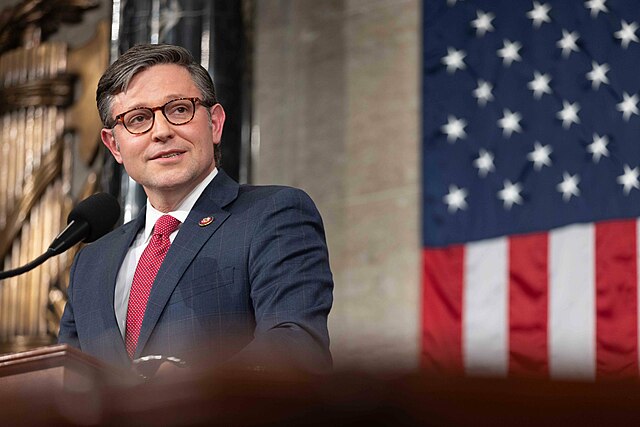
In 2016, the year new Republican Speaker of the House Mike Johnson was first elected to Congress, there was major flooding across Louisiana in what was then called the worst natural disaster since Superstorm Sandy. While much of the high water was in southeastern Louisiana, there was also flooding on the Red River in Shreveport, in the northwest part of the state — the area Johnson represents.
There are structural reasons why the flooding happened: years of built-up silt in riverbeds that make water levels higher, and the commercial and residential development of formerly industrial urban waterfronts like Shreveport’s.
But those small changes are only compounded by the biggest difference in Louisiana and elsewhere across the country, where rivers are cresting higher and more often due to record-breaking storms: climate change.
Johnson, who is now third in line to the Presidency, simply does not believe in climate change.
And Black Americans, who are on the frontlines of the climate crisis, have the most to lose from further delays to the kind of comprehensive climate legislation the country needs, and Johnson is sure to block — including in majority-Black Shreveport.
“The climate is changing, but the question is, is it being caused by natural cycles over the span of the Earth’s history? Or is it changing because we drive S.U.V.s? I don’t believe in the latter. I don’t think that’s the primary driver,” Johnson said at a 2017 town hall. Meanwhile, the oil and gas industry contributes the most money to Johnson’s political campaigns.
When the Green New Deal was introduced in Congress by Rep. Alexandria Ocasio-Cortez in 2019, Johnson called the plan “a thinly veiled attempt to implement the policies that would usher in a new socialist society in America.”
Which, even if that may actually be the case, does not bode for the future of climate policy in the United States while he’s able to set Congress’s agenda.
A former oil town in the northwestern part of the state, Shreveport is where Johnson was born, and is the main population center of his largely rural district. The red line map for Shreveport from the 1930s does not include many of the current waterfront neighborhoods, as they were industrial at the time, but the few residential areas that did touch the river were all redlined.
One area that sits just above the confluence of the Red River and a tributary, includes the note, “the section is in what is known as the river bottoms” — in other words, low-lying, flood-prone land.
Today, census records show that area, as well as nearly all of the city’s waterfront neighborhoods, are predominantly Black.
It’s not just a matter of opinion but of established climate science that we have already entered into an “uncharted” phase of climate change, and we’re here as a result of human-related carbon emissions.
When heavy rains from Hurricane Harvey once again sent the Red River over its banks in 2017, Johnson told The Daily Advertiser, “The scope of this disaster, they’re saying now, will be likely unprecedented.’’
It’s a word that gets thrown around a lot in response to natural disasters, unprecedented, and for good reason.
It’s not just a matter of opinion but of established climate science that we have already entered into an “uncharted” phase of climate change, and we’re here as a result of human-related carbon emissions. But if you can connect all of the unprecedented floods to a common cause (or refuse to do so), then there’s no necessity for a systemic solution.
In the case of Harvey flooding, the fiscally conservative Johnson told The Daily Advertiser that the government should have limited roles, “but among those limited roles is a disaster exactly like this,” and that federal money should be made available to communities like Shreveport.
But what about the ongoing disaster of the climate crisis?
In 2020, Lousisana’s then-governor, John Bel Edwards, noted that “The 2016 floods were a devastating reminder that Louisiana’s historical approach to managing flood risk no longer works.” At the time, Bel Edwards was announcing $6.6 million in federal funding for flood-protection projects in Shreveport and the surrounding Caddo Parish.
It should concern us all that someone with such extreme views and so beholden to the fossil fuel industry has such power and influence during a time when bold action is more critical than ever. BEN JEALOUS, EXECUTIVE DIRECTOR, THE SIERRA CLUB
But the first piece of legislation the Republican-dominated Congress passed under Johnson’s leadership scaled back federal efforts to reduce carbon emissions and fight climate change.
In Johnson’s first week on the job, Republican-backed legislation slashed $5.5. billion from climate-related programs in the Inflation Reduction Act. The cuts targeted energy efficiency incentives for appliances and support for greener building codes and chopped funding for the Energy Department’s energy efficiency and renewable energy office.
“House Republicans electing a champion of the fossil fuel industry who rejects climate science and led efforts to undermine our democracy in working to overturn the 2020 election should surprise no one,” Sierra Club Executive Director Ben Jealous said in a statement. “It should concern us all that someone with such extreme views and so beholden to the fossil fuel industry has such power and influence during a time when bold action is more critical than ever.”



